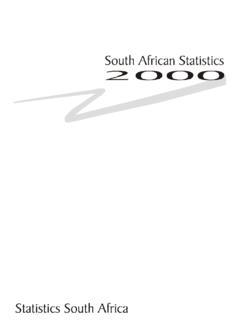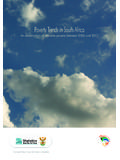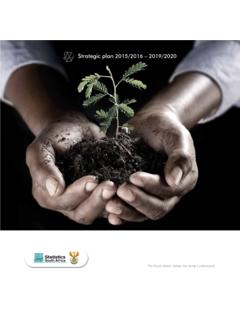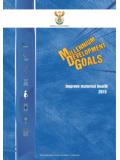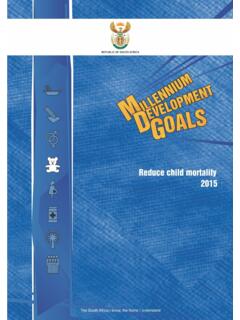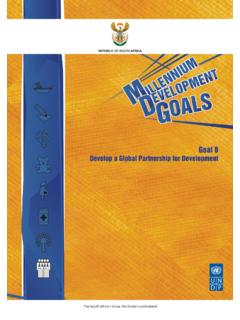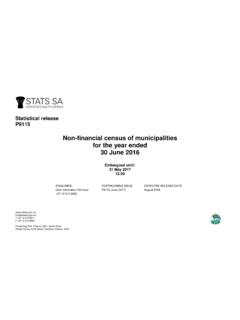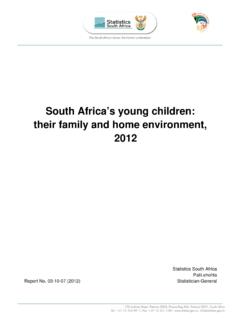Transcription of Report Version Page Africa - Statistics South Africa
1 Draft MDG Report Version 1 1 | P a g e The South Africa I know, the home I understand ACKNOWLEDGEMENT. This third progress Report on the Millennium Development Goals (MDGs) was produced with financial assistance from the United Nations Development Programme (UNDP). The Report is a joint effort by the Government of South Africa , the Civil Society Organisations (CSOs), including business interests of South Africa and the office of the United Nations Resident Representative in South Africa . The preparation of the Report was led by Statistics South Africa (Stats SA), which is the MDG Secretariat and as such provided overall direction and coordination. The Report benefited from the contributions by United Nations agencies, most specifically UNDP and UNICEF.
2 In particular, the active advocacy and participation by the CSOs who, on their own, found it fitting to organise a CSO Summit on the MDGs and emerged with the Cape Town Declaration on the MDGs. They provided an invaluable and refreshing perspective on the successes, challenges, recommendations and a programme of action for the MDGs. Their persistence on further provincial consultation even in the dying minutes of finalising the Report guaranteed stakeholder ownership and thus made this Report a truly MDG Country Report . The Report acknowledges substantive inputs received from all members of the Sectoral Working Groups (SWGs), the National Coordinating Committee (NCC), and the Report Drafting Team. South Africa is one of those few African countries with adequate data for purposes of the MDGs.
3 In particular for MDG 3, 4, and 5, South Africa has a sophisticated cause of data registration system and on MDG1, South Africa conducts regular income and expenditure surveys. Yet despite these advantages, the MDG process has laid bare some of the serious deficiencies in data quality as well as data gaps. As a consequence of quality issues, some data items remained hotly contested to date. In an endeavour to make the MDGs relevant to South Africa , a number of indicators were domesticated and a total of 95 indicators were addressed to address the eight MDG goals. The overall process for managing the MDG Country Report and in particular the explicit application of the South African Statistical Quality Assessment Framework (SASQAF) on all indicators ensured that the discourse and conclusions were based on rational processes and statistical information of the best quality possible.
4 Going forward we shall continuously review the indicators in an effort to apply the most recent available data. Pali Lehohla Statistician-General South Africa The South Africa I know, the home I understand 2 | P a g e FOREWORD. In reviewing the MDGs in the context of other developing countries, it is important to appreciate some unique characteristics of South Africa and not surprisingly, a review of these goals suggests a mixed picture. In some cases, South Africa has achieved its MDGs more than five years before 2015, while in others South Africa is far from achieving these MDG targets. Between these two extremes are goals where achievements are probable or possible. In these cases, appropriate government interventions remain key to making these goals achievable.
5 While South Africa has a sophisticated infrastructure, a well-developed private sector and a stable macro-economy, it suffers inequality in education, specifically as regards access to quality education and access to quality health care. The latter especially, combined with the high prevalence of HIV and AIDS, explains why South Africa has not achieved some targets for those MDGs related to outcomes such as employment and income levels (these are impacted on directly by education), as well as life expectancy which is impacted by health conditions. As a middle income country, South Africa is less dependent on foreign aid, and improvements in the MDGs will depend on how well government and other stakeholders mobilise domestic resources to achieve these targets.
6 The macro-economic environment of benign inflation holds promise, but even in the best of times growth reached a plateau at 5% in an economy requiring at least 7% to achieve both its employment and redistributive consequences. South Africa has experienced a decline in poverty largely as a result of a significant income transfer programme, massive reallocation of pro-poor expenditure, for example on housing, water, electricity and sanitation. Not surprisingly, South Africa has achieved or is close to achieving the dollar-based purchasing power parity adjusted targets. In order to make bold statements on progress or lack of it, we need Statistics as the basis for evidence policy making. An overwhelming majority of African countries do not have data for measuring MDGs and these challenges have to be addressed.
7 Consequently, as a patron of the Young African Statisticians (YAS), under the ISIbalo banner, I am pleased to Report that the YAS will host a conference focusing on the MDGs in South Africa in December this year. More than 150 papers covering all goals of the Millennium Declaration will be presented by young African intellectuals. Furthermore while the challenges of data remain supreme, African countries have mobilised under the banner of the African Symposia for Statistical Development (ASSD) to conduct a census in the 2010 Round of Population and Housing Censuses. The ASSD has now run for five years with the theme Africa Counts . The next theme for this ambitious African statistical development agenda will be to ensure that the vital registration systems work in and for Africa .
8 In this regard African ministers of home affairs took a resolution that African statisticians prioritise the production of vital Statistics and ensure that a credible raft of Statistics in Africa is created. If you cannot measure it, you cannot manage it. We shall therefore appeal to our partners that we hold hands in this endeavour of statistical development in and for Africa . T A Manuel, MP. Minister in the Presidency: Planning The South Africa I know, the home I understand 3 | P a g e PREFACE. I am pleased to present South Africa to the world. This time around it is not through the FIFA World Cup. I am presenting to you the South Africa I know, the home I understand. I do so in facts and figures and demonstrate our unflinching commitment to South Africa 's, Africa 's and the world's development agenda.
9 South Africa has committed to the eight Millennium Development Goals and embraced them into a national set of ten priorities. No doubt a development agenda of this magnitude is a national effort and at the global level it demands a global and coordinated effort. This is the reason that South Africa understood this global agenda as the single most important agenda for resolving its development challenges. In addressing the scourge of poverty, MDG 1, a South Africa 's first priority, we shall speed up growth and transform the economy to create decent work and sustainable livelihoods. In this regard we have seen sustained growth in South Africa prior to the economic crisis of 2008. We are committed to a path that builds economic and social infrastructure not only to reverse the 2008 economic crisis setback but progress towards decent work.
10 We are aware that we have a massive backlog of skills and whilst we have achieved the MDG. 2 of universal primary education, we remain aware that the quality of our education holds back our route to development. In this regard we shall strengthen our skills and human resource base. Our health is our life and MDGs 3, 4 and 5 are our life. South Africa feels the burden of disease with the scourge of HIV and AIDS stubbornly reversing gains made in life expectancy. To address this, our priority is to improve the health profile of all South Africans. South Africa , prominently with other African countries, works on continental peace, stability and development. In this we are informed by our priority of pursuing African advancement and enhanced international cooperation.
